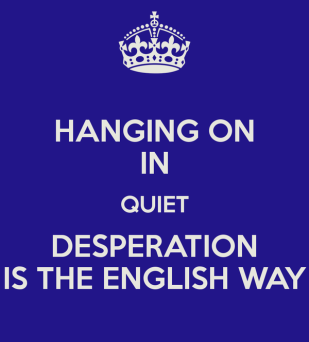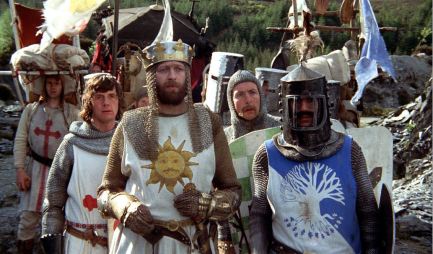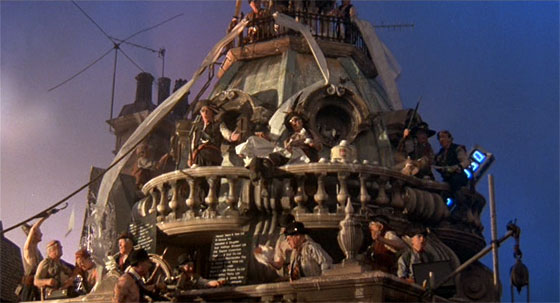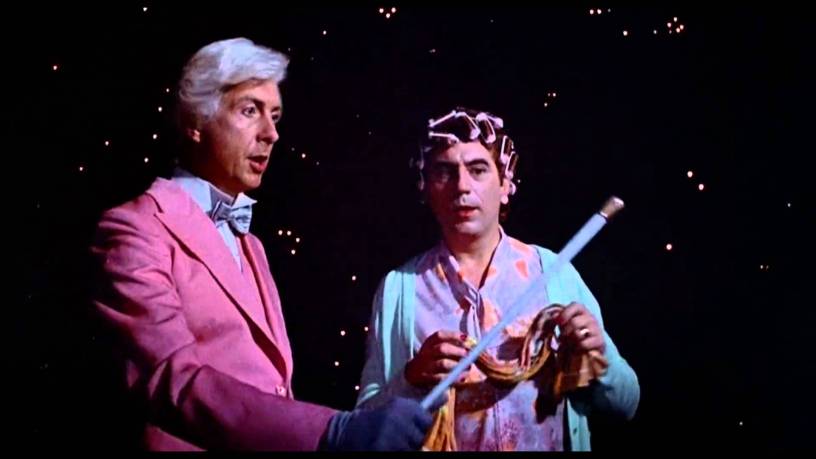There’s a line in Time by Pink Floyd that perhaps points to a fundamentally pessimistic attitude in the hearts of Brits.

Not being a Brit myself, I don’t know if it’s true that Brits are a miserable lot. It seems that Russians take the cake on the truly miserable outlook on life,maybe followed by Scandinavia (despite surface appearances, if you look at Bergman). But perhaps what makes the Brits different is the way they spin this negativity into humor.
Back in the 80s, being into Monty Python was sort of a rite of passage, at least for those in the freaks and geeks bucket. It requires a certain amount of maturity to make sense of satire, as it references socio-political topics. So as an adolescent, you felt a little smarter than the average kid to say you liked Monty Python.

The funny thing about Python is how far ahead of its time it was. These days in the age of the internet, its brand of biting satire is now very popular, although more specifically, what’s most popular is parody rather than satire, as most Youtube clips hijack pop culture rather than create anything truly new. Therefore today’s humor is more of a descendant of something like Airplane! rather than Python.
However, insofar as today’s humor that is laced with a socio-political subtext, Python could be seen as a trailblazer. This may sound like I’m writing this post in praise of Python, but at midlife, I see a darker side vs. how I felt as an adolescent.
Adolescence is a time of rebellion. It’s natural to feel critical of the status quo. Python offered a vehicle to criticize all manners of status quo, not unlike, let’s say, punk music.
The problem then becomes, where do you go after you’ve presented a world which is full of corruption, ignorance, and man’s inhumanity to man?
There is a curious intersection-point between Python and Pink Floyd, because Floyd in the 70s also sought to sort of ask what the meaning of life was, and passed through an abyss of depression and hopelessness. Another point of comparison would be the work of Douglas Adams (another brit) who brought us the number 42 as the meaning of life in Hitchhiker’s Guide to the Galaxy.
The 1970s were a period of pretentiousness. As acts got more popular they felt like they wanted to tackle bigger and bigger topics. As much as Python was seemingly willing to bust its own chops, it succumbed to the temptation of believing in its own self-importance with its final two films, Life of Brian and The Meaning of Life (OK, the last one is early 80s).
They say comedy is tragedy plus time. Python took the tragedy element to its ultimate extent in Life of Brian, aiming straight for the most sacred of sacred cows:
But it was really The Meaning of Life that pushed things to its ultimate extent. And it’s no coincidence that Meaning of Life came out around the same time as the movie version of Pink Floyd The Wall. One can see them as two sides of the same coin. *

When I was 13, when this film came out, I still had the rest of my life ahead of me. It didn’t seem that threatening to be hit up with a caricature of grotesque middle-age in the form of Terry Jones in drag. Now that I’m middle-aged and facing down the inevitable grind of aging, infirmity, and mortality, this brand of humor cuts a little too close to home.
The problem I have with these sorts of artistic statements is they only present problems. They offer no solutions beyond suggesting that we simply laugh it all away.
I find the majority of today’s political discourse falls into the bucket of mockery and caricature. Both sides have their own flavor of mockery and never the twain shall meet.
At its worst, this increasing reliance on humor with a cynical bent becomes a form of learned helplessness.
There’s one word lacking in all this: hope. Hope isn’t funny, though, so there’s no reason for Python to provide any of it. The tension in Python’s storytelling comes from the way the audience is always denied an adequate resolution, perhaps best demonstrated in the anti-climactic ending of Holy Grail:
I don’t take away the fact that many Monty Python skits effectively rip to shreds many sacred cows, but that perhaps by being so relentlessly critical of so many things, including various human cognitive flaws, that it paints a really hopeless self-portrait and leaves one wondering why it’s worth soldiering on for another day. Makes me think of a quote from a Robin Williams movie…

But then we know how Robin Williams turned out…
–othreviewer
* Dark Side of the Moon actually helped fund Monty Python and the Holy Grail.


I’ve never thought of Monty as depressing but then you seem to be referencing the movies which I’ve never liked. The TV show was, I thought, wonderful and deeply rooted in UK culture. I remember once when I had a job in a call centre. I had just put the phone down after speaking with a very difficult customer when the phone rang again. It was a colleague sat opposite and he just said ‘is this the right room for an argument?’ The two of us just laughed and laughed. Take a look on google for that quote and you’ll understand. Best wishes from the UK.
LikeLike
I agree that the TV show is much more light-hearted than the movies. I think in the 70s that Python sort of let their success go to their heads and they became too overtly political.
LikeLiked by 1 person
yes, certainly go along with that!
LikeLike